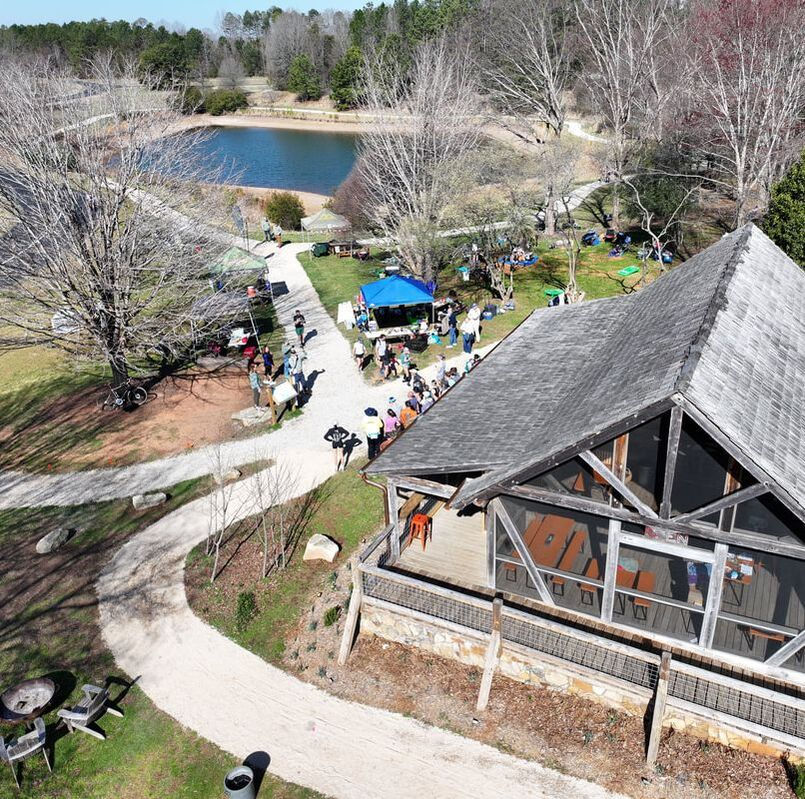Backpacking Crowders Mountain
- Melissa McCauley

- Dec 11, 2019
- 4 min read
Updated: Aug 25, 2020
Backpacking Crowders Mountain
It’s 2 p.m. on Thursday afternoon and the weather across the Carolinas looks promising for the coming weekend. You need a break from the daily grind and a chance to reconnect with nature, but you don’t want to drive two to three hours to the mountains or the coast. Guess what? The answer is right under your nose in Gaston County.
Just a 30-minute drive (and one-mile hike) away from Charlotte is a cluster of 20 backcountry campsites tucked into the rolling hills of Crowders Mountain State Park. Originally proposed by the Gaston Conservation Society in an effort to block mining of the area in the 1970s, the park encompasses a Piedmont monadnock habitat that is home to fern, dogwood, mountain laurel and a wide variety of wildlife, including frogs, salamanders, snakes, raccoons, squirrels, turtles, hawks, owls, and woodpeckers.

Though backcountry camping has been available at the park since the 1980s, recent site improvements and an online reservation system has transformed a little-known park asset into a major draw for visitors from Charlotte. The campground is one mile by trail from the park visitor center and parking lot, a fact Park Ranger Kelly Cooke can’t emphasize enough.
“Campers arrive thinking this is car camping, even though it says backcountry camping on our website,” Cooke says. “People need to be prepared to hike in and hike out carrying all their gear.” He recommends packing light and bringing no more food than you absolutely need. According to Cooke, campers have tried to use wagons to transport food and gear, but rocky trails more often than not result in broken wheels and axles.
Reservations are required for all campsites. While walk-up reservations are accepted, sites are not typically available on a day-of basis, especially on weekends and holidays. All camping trips start with a stop at the Sparrow Springs Access Visitor Center front desk to register. If the visitor center is closed, campers are required to fill out and submit registration information in the self-service registration box at the trailhead.

The Pinnacle Trail leading to the camping area departs the visitor center near the butterfly garden, making a left turn within a few hundred yards to ascend slowly over .6 mile to the campground turn-off. The trail is mostly packed dirt with patches of rocky terrain. The last .4 mile descends slowly through heavier tree cover to a T, with options to turn right to group campsites and left to family camping. Both areas have water access, vault toilets, and garbage and recycling collection areas, a luxury for backpackers used to packing out their trash.
Cooke stresses the need for campers to properly dispose of trash in containers. “Campers should not burn trash in their fire rings,” he says. “We have raccoons and squirrels now, but bears are coming down from Cleveland County. One was found in Kings Mountain Military Park, so it’s only a matter of time.”
In the last two years, upgrades from outhouse facilities to vault toilets housed in new buildings near central garbage and recycling collection, and expansion of the water system to multiple access points throughout the campground, has dramatically improved campground amenities. In addition, a central pump now supplies treated water to campers. The family camping area has been reconfigured to provide additional privacy, especially at sites five and six. Three sites—numbers seven, eight and nine—have been added to the group camping area and two ADA-accessible sites have been added, one for family campers and one for groups with handicapped participants.

Other do’s and don’ts: at least one camper in your party must be 18 years or older; sites cost $10-$32 per night; no alcohol is allowed (violators are sent home immediately); no cutting down trees for firewood; and tents must be pitched on tent pads in the family campground. Rangers patrol to make sure campers are prepared and safe. Park gates are locked from one hour after park closing (varies by season) until 7 a.m., so campers should arrive prepared to stay through the night. Restrictions on ADA-accessible sites are enforced strictly to make sure the park’s two sites are available for and used by campers needing ADA-accessible facilities only.
Heavy three-season tree canopy and rolling topography create a remarkably peaceful haven in the midst of the heavily-used park. Most sites offer privacy and a decent buffer from neighboring campers. Firewood is provided in camp for a $5 fee, another luxury not typical of backcountry camping. Campers are not allowed to bring firewood in from other locations. Each family camping site includes two tent pads, a picnic table, and a fire ring with grill. Group campsites offer the same amenities but without tent pads to accommodate anywhere from 15 to 25 campers, depending on the site. Scout, church, and school groups are the most frequent users of the group camping area.
In addition to the backcountry bliss of tent camping under the stars, campers can take advantage of ranger programs and special events, day hiking the park’s extensive trail network, rock climbing, orienteering, and, when water levels permit, canoeing on the park’s only lake. Often groups will combine backcountry camping with a service project like trail maintenance work. Whether you choose to stay a night, a weekend, or longer, it’s a great feeling to realize that backcountry adventure is only minutes away.
Originally written by RootsRated for Gaston County Gov.


































